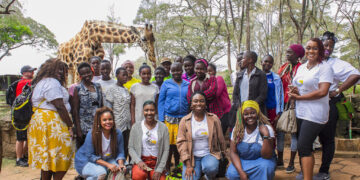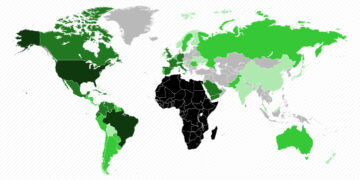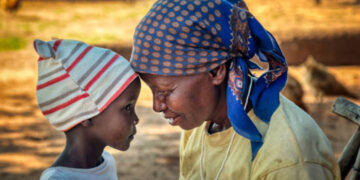The Culture Tube caught up with Anthony Ketter, COO of Leta, the Operating System for
Supply Chain and Logistics in Africa. Ketter talks about his return to Kenya, navigating the business environment back home and his projections for the future.

Anthony Ketter’s assignment was clear right from the beginning and he understood it. “I was to go get my degree, understand some learnings, and then come back and join the family business.”
Ketter graduated with a Bachelor’s degree in business administration from Morehouse College, one of the top HBCUs in the US. Once he touched down in Kenya, he literally hit the ground running. “I landed on August 2nd and I was in the office on the 3rd.”
At the time he got involved in the family business, they were executing construction and site maintenance contracts for some of the telcos in Kenya. “What we would do is, construct telecom towers for some of the telcos. Once constructed, we would also maintain these base stations. We also had a maintenance contract to make sure that the sites were fully functional.”
Ketter’s family also owns a tea farm, where they sell its produce to manufacturers in the country. “The tea business is kind of automated and has its own functions.” Ketter explains.
Whilst acknowledging the differences between the U.S and Kenyan business environments, Ketters says settling back home wasn’t so difficult. “There were definitely some adjustments that I had to make, but I think I had the benefit of being able to come and work in an established business through the family. But it’s definitely a different approach, and you have to be able to understand the nuances and really understand the culture.”
After leaving his family’s business, he spent some time working in the FMCG space with the Carlsberg Group, where he started out as an urban ambassador. He transitioned to being the business development manager at the Danish Brewing Company East Africa Ltd., which has a licensed partnership with the Carlsberg Group A/S. “I was doing some business development work out there, leading the distribution of the company’s products across Nairobi.”
After his stint at the Danish Brewing Company East Africa, he joined the tech startup, Leta, where he is one of three founding members. “Leta is the operating system for logistics and supply chain in Africa, and we are working with businesses across multiple industries, including FMCGs, pharmaceuticals, distributors and manufacturers, to help them optimize their last mile delivery and save money while doing so.”
He goes on to explain, “So, if you’re delivering from your warehouse to the depot, and then to last mile customers, our solution plugs in to really help you either, travel less kilometers by route optimization, or reduce utilization through our load optimization algorithms. I could almost call it deep tech.”
Ketter, who is Kenyan-Ugandan, is the COO at Leta, while the founder and CEO, Nick Joshi is Kenyan-Australian, and the CTO, Kip Maritim, is Kenyan.

“We’re almost a year and a half old,” says Ketter, “and it’s been a great journey trying to understand how our solution can solve some of the inefficiencies in the space.”
Some of their initial challenges included, “Trying to understand how to best position ourselves to really demonstrate the value that we are gonna be able to provide our customers. The first three months were like a discovery, understanding the marketplace and getting that product fit…that validation. And then, really being able to plug into those systems, to provide true end to end efficiency.”
Speaking on Leta’s growth, “Once we got that down, we were in a good position to be able to scale appropriately, but also to communicate the value that we were presenting to our customers, and from there, build our product and get it to a place where we now have 20 plus customers, working with some of the leading distributors and manufacturers in the country.”
According to Ketter, Leta launched in Zimbabwe in October 2022; and the following month in Zambia. “Right now, we’re kind of focused on deepening our presence in Kenya, looking to support Nigerian distros and businesses, as we scale and expand into other markets in 2023.”
Leta recently raised $3m in a pre-seed funding round,as published in TechCrunch. The 4Di Capital, Chandaria Capital, Chui Ventures, PANI, Samurai Incubate and Verdant Frontiers Fintech participated in the round, while Cellulant co-founder, Ken Njoroge, and Google executive Charles Murito, made investments too. “It’ll really help to propel us into some of these other international markets.”
Kenya is one of the countries referred to as the “big four”—the leaders in Africa’s start-up ecosystem. The other countries are Nigeria, South Africa and Egypt, and are the recipients of 92% of Africa’s investments in tech, according to an article by the World Economic Forum.
Ketter describes the business environment as a productive one. “That’s why you see a lot of multinational companies have set up their African HQ over here or, you have a lot of tech startups with some investments from Western VCs, because they understand that the climate here is kind of ready.”
And while he gives credit to the adaptive nature of Kenyans, as one of the reasons the business environment is productive, he quickly adds a caveat, “We’re ready to adopt change, and we’re quick to adopt things. The only thing is, if you go wrong we’re very quick to go back to what we were using.”
What’s Leta doing right and how have they maintained their presence in Kenya? Ketter gives us a glimpse into their strategy. “We don’t really pitch products. We continuously speak about value, and as a business, we’re very focused on continuously optimizing our solution. There are businesses that figure something out and they’re like, ‘this works, so I’m just going to keep doing this and hopefully, it will be able to grow at the same pace.’ But I think a great way that you get embedded in a particular marketplace is by that initial value you provide, but also staying close to your customers, understanding what the marketplace is saying and being able to validate that to further embed yourself within the marketplace.”
With a current workforce of 20 people, Leta currently powers all of Simbisa’s brands—one of the largest quick service restaurant chains on the continent; Chandaria Industries, an FMCG conglomerate; Twiga, a B2B e-commerce distribution platform; and ShopZetu, a fashion marketplace.
“We have built our technology here in Kenya, with Kenyan engineers and a very talented crew. As far as our business is concerned, we’re keen to work with strategic partners that can also help us expand to other regions of the continent. But also stay ahead in terms of what’s happening in tech, and what responses we are getting from our customers that can allow us to provide more value to them.”
When he’s not up to his ears in work? “I try to get to the gym—it’s a stress reliever. I have a two-year old boy, so I try to get in time with the family when I can too. I also love a great HBO show. Send some suggestions my way.”

On being proudly Kenyan, “I love how Kenyans are fearless. I learnt how to handle my own in different scenarios while here in Kenya, and know there is always a solution. Our banter is also undefeated. Look up KOT.”
A book that has impacted him? Letting Go, by David Hawkins. The book really taught me how to release emotions, let go of inconsequential events and focus on the real important things in my life.































